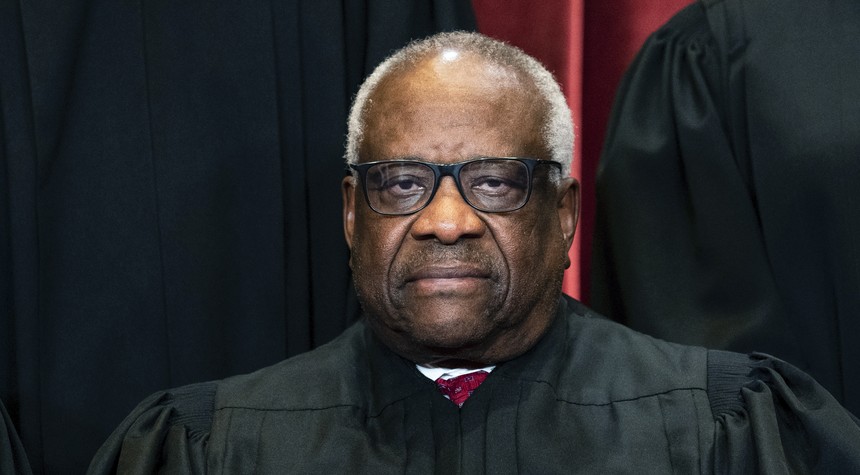Senate Introduces Code of Conduct Bill for Supreme Court as Democrats Call for Thomas Resignation
Because it has worked so well for politicians, the Senate has introduced a bill that would require the U.S. Supreme Court to create a code of conduct for itself. The bill, introduced by Sens. Angus King (I-ME) and Lisa Murkowski (R-AK), would require the court to put into place a code of conduct within one year of becoming law and also post the code of conduct on the court website for public viewing. There would also be a requirement that the court designate someone to take receive any complaints of code violations and give authority to the court to conduct investigations to determine if any justices or staff had engaged in activities that would interfere with the administration of justice, or if any laws had been broken or additional codes of conduct violated.
The call for a Supreme Court code of ethics comes in the wake of revelations that Justice Clarence Thomas accepted several trips from billionaire Harlan Crow. Thomas and Crow have been friends for almost thirty years, and Thomas stated that the two took trips along with their wives “as friends do.” Crow has also been a Republican donor in the past. Thomas also went on to say about the revelations that, “Early in my tenure at the Court, I sought guidance from my colleagues and others in the judiciary, and was advised that this sort of personal hospitality from close personal friends, who did not have business before the Court, was not reportable.” Sen. King said in a statement:
The Supreme Court Code of Conduct Act is a commonsense step to restore and maintain faith in the high court by requiring the creation of consistent, transparent rules like the ones that apply to every other federal judge across our democracy. The other two branches of government already have codes of conduct, it is only reasonable the full Judiciary should as well.
While King is correct, in that the other two branches of government have codes of conduct, the Supreme Court is a much smaller club, is theoretically non-partisan, and already adheres to principles of the Judicial Conference’s code of conduct. The Judicial Conference oversees policymaking for the federal courts. And while the impeaching of presidents, not for “high crimes and misdemeanors,” but for political expediency, has become the norm in the legislative branch, a code of conduct among Congress members and Senators has not exactly been a deterrent to bad behavior.
Nonetheless, the reports of Thomas’ activities with his long-time friend have given Democrats yet another reason to be outraged, and they have scheduled a hearing on the proposed bill for May 2, billed as a review of Supreme Court ethical standards. Chairman of the Senate Judiciary Committee Sen. Dick Durbin (D-IL) invited Chief Justice John Roberts to testify before the committee. Roberts politely declined in a letter to Durbin, saying in part, “Testimony before the Senate Judiciary Committee by the Chief Justice of the United States is exceedingly rare, as one might expect in light of separation of powers concerns and the importance of preserving judicial independence.” For emphasis on his “no” to testifying before the Committee, Roberts also attached a copy of the “Statement of Ethics Principles and Practices” followed by the Justices.
Because he is a black conservative, Justice Thomas has been a thorn in the side of Democrats since his confirmation, and on Monday, Sen. Ed Markey (D-MA) called for Thomas to resign. In a snark-filled patronizing statement, Markey stated,
“I will say what needs to be said: Clarence Thomas should resign from the Supreme Court of the United States. His reputation is unsalvageable. It is evident that he cannot judge right from wrong. So why should he be judging the country’s most important cases, on its highest court?”
Sens. King and Murkowski also brought up the idea of a code of conduct making the court more “transparent.” Murkowski said,
“The American public’s confidence in the Supreme Court is at an all-time-low. Americans have made clear their concerns with the transparency—or lack thereof—coming from the Supreme Court and its justices.”
A Gallup poll published in June of 2022 appears to bear that out, with just 25 percent of American adults saying they had “a great deal” or “quite a lot” of confidence in the Court. That is a drop from 36 percent in 2021. But perhaps what King, Murkowski, and others may be missing is that transparency might not be why Americans have little confidence in the court, but rather the extreme partisanship that takes place during the nomination and confirmation process to a body that was never meant to be partisan.
Republicans on the Judiciary Committee said the hearing is just an attempt to embarrass Justice Thomas and had encouraged Roberts to decline the invitation.





Post a Comment